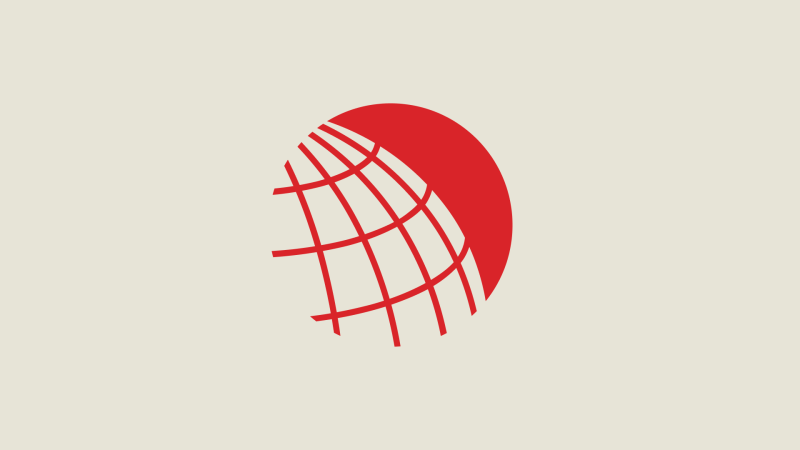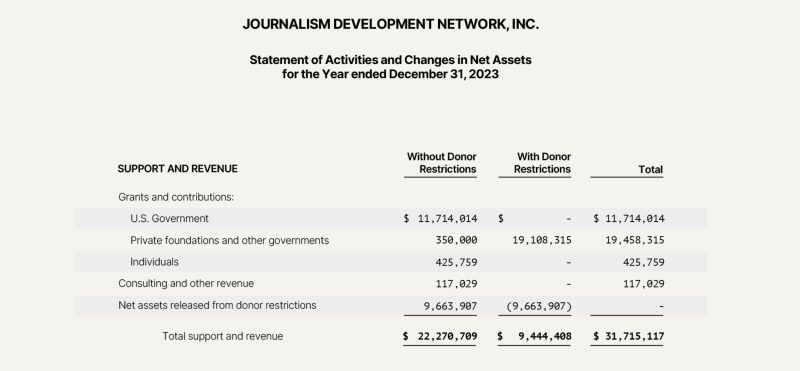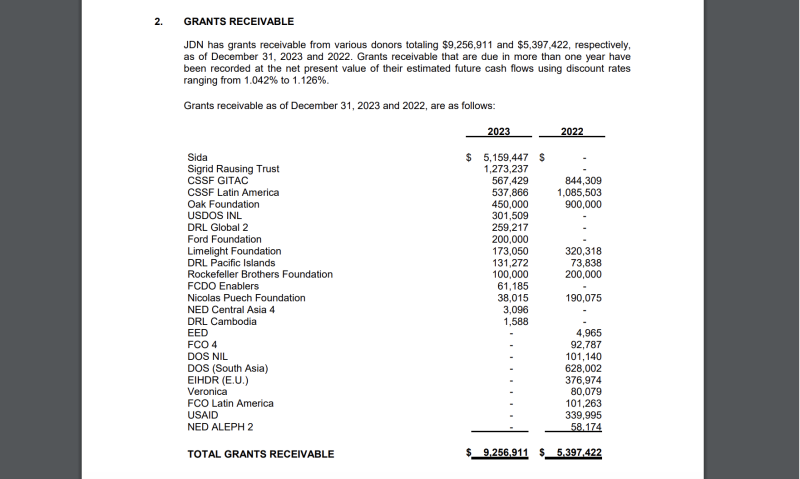Where does OCCRP get its money?
We are a donor-funded nonprofit organization. The breakdown of our donors changes every year, but typically we received funding from governmental donors, including from the UK, Sweden, Denmark, and New Zealand, as well as a number of private foundations that support investigative journalism and private individuals. In total, we have around 50 separate grants from these donors.
We are always working on diversifying our sources of funding in order to remain financially stable. A few years ago, we launched the “Accomplice” membership program as part of this effort.
Transparency is important to us, and our annual reports, audits, and 990 nonprofit tax forms are all available online. We have a four-star rating from Charity Navigator, which ranks U.S.-based nonprofits on their financial accountability and transparency, and a platinum seal of transparency from Candid/Guide Star, a similar organization.
If you’d like to learn more, here are some publicly available sources of information on our donors and finances:
Our recent annual reports and financial statements
Our 990 forms and audits on ProPublica’s Nonprofit Explorer
What does OCCRP do with this funding?
In addition to our editorial work, which includes collaborating with local journalists to produce and publish investigations, we also provide our network with research and data support. This includes access to a team of experienced cross-border researchers who can help journalists anywhere in the world track down corporate records or land titles half a world away. We also provide our network, and other journalists in need, with digital and physical security support.
Over the years, we’ve also helped independent investigative journalists in countries like Russia, Serbia, Romania, Solomon Islands, Georgia, and Slovenia set up their own media organizations. We provide support, resources, experience, and encouragement, but our partners are independent of OCCRP and make their own editorial decisions.
A large proportion of the money we received from donors is also “passed through” OCCRP and distributed to local media organizations that might have trouble getting larger grants on their own.
How does OCCRP decide what stories to publish?
OCCRP is a network of journalists who live in every corner of the world. Compared to traditional media outlets, we are very decentralized, and most of our investigations come from local partners who bring us the stories they feel are important to tell. Their ideas are then developed in collaboration with a team of editors who work globally.
Some of our stories also come from large data leaks, which we are well-equipped to work with thanks to our investigative data platform Aleph, or from human sources who come to us with tips and information about wrongdoing. Sometimes our central editorial team also decides to pursue stories or projects on topics we have special expertise in.
When a reporter in our network wants us to publish a story, we assess it along several lines. We look at whether the story uncovers wrongdoing, breaks new ground, matters to citizens and is in the public interest, and has the potential to be impactful or important, either locally or internationally. We prioritize stories that uncover significant wrongdoing, particularly related to corruption, organized crime, and their nexus with political power. Because our investigations cover very serious issues, we also need to make sure that we can prove our claims — through documentary evidence whenever possible. Our editors strive to ensure that every story we publish meets high standards of proof, fairness, and clarity.
What OCCRP does not do is tell partners what to publish. Even though OCCRP may provide money for a story, our partners always have the right to run their own stories from their own perspective. This diversity of viewpoints makes the content of our network stronger.
Can you run a story if you don’t have a donation for it?
Absolutely — and, in fact, we do not accept donations to do specific stories or projects. The process works the other way around: Our editorial team comes up with projects and story ideas, and after they are published, administrative staff members determine how to charge these stories against grants we have received. Since stories are assigned to grants retrospectively, journalists working on them do not know who paid for the work.
Does OCCRP accept US government money?
In the past we have, but as of mid-2025, OCCRP has minimal U.S. government money. A decision by the current U.S. administration ended most foreign assistance in early 2025, including funding for almost all media work. This included the closure of all but three of our U.S. grants, which we expect will close soon.
OCCRP has sued the U.S. Department of State and the Trump administration for the illegal closure of the grants. We did not do this in order to maintain our funding — we understood the current U.S. administration would not continue to support the important work we do — but because we saw this decision as illegal. Under the U.S. Constitution, what the government spends is decided by Congress and not the executive branch. We are obligated by ethical practices to speak out when illegal actions occur. The case is ongoing.
Do OCCRP’s donors have any influence over editorial policy?
No. Just like a traditional newspaper, which maintains a strict “firewall” between its advertising and editorial departments, we have a division between staff who handle donations and those who produce the journalism. Donors never have access to editorial meetings or any aspect of our editorial process, nor do they have input into what stories we publish.
We also guarantee our editorial independence by adding written language into relevant grant agreements that explicitly states we will retain complete editorial control over our work. Here is what that looks like:




